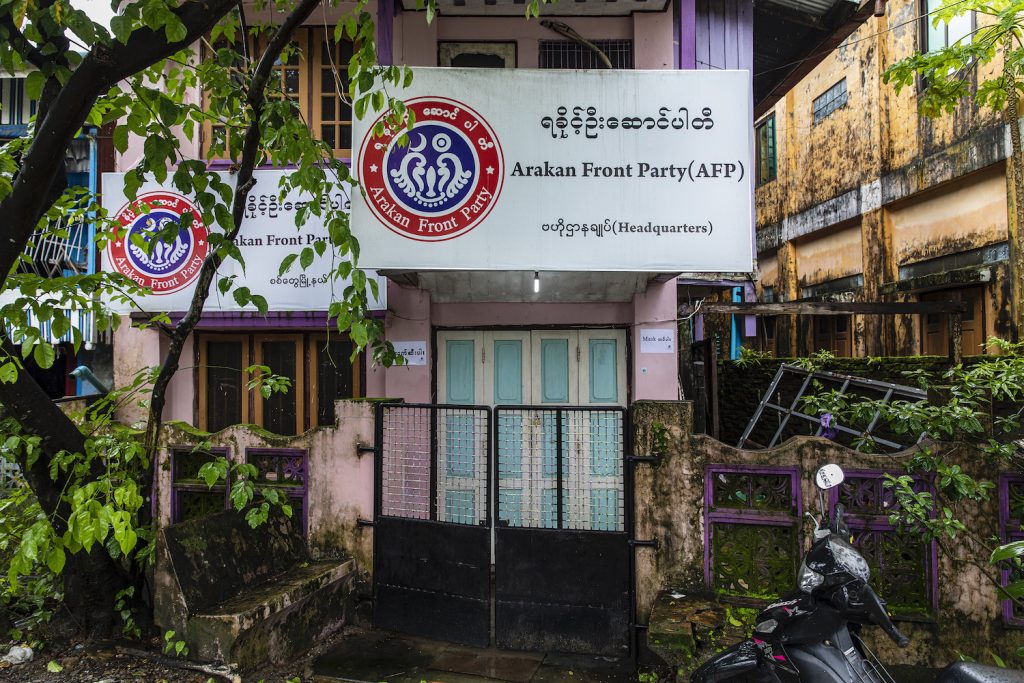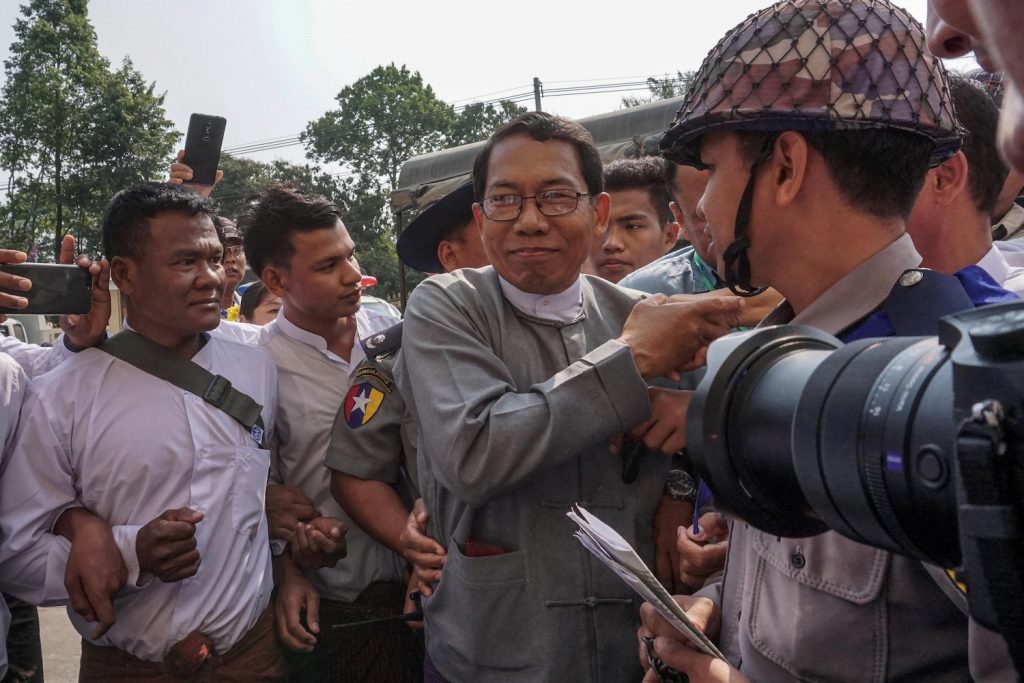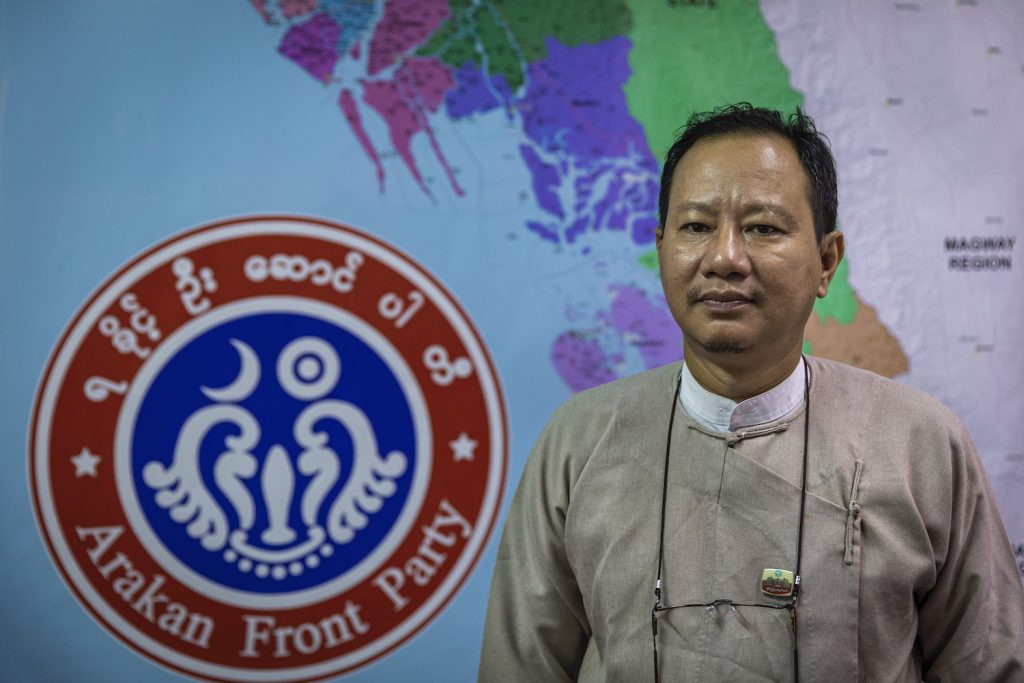Frontier’s Kaung Hset Naing talks to the vice-chair of the Arakan Front Party, U Kyaw Zaw Oo, about the threat posed by armed conflict and COVID-19 to the election, and the upstart Rakhine party’s dream of self-determination.
By KAUNG HSET NAING | FRONTIER
Armed conflict between the Arakan Army and Tatmadaw and a recent surge in COVID-19 infections make the prospect of voting in Rakhine State look increasingly doubtful. But if the November 8 election does go ahead across Rakhine – with cancellations confined to only the most conflict-hit village tracts – the state will be in for a fierce contest.
Since the Arakan National Party won the largest haul of seats in Rakhine in the 2015 election, Rakhine nationalist politics has splintered into different factions. After a segment of the ANP broke away to re-establish the Arakan League for Democracy in 2017, ANP chair Dr Aye Maung resigned in November that year.
The following January, he was arrested for giving a public speech that accused the Bamar-dominated government of treating the Rakhine people “like slaves” and was sentenced in March last year to 20 years for high treason. While still on trial, he founded the Arakan Front Party.
In an indication of Aye Maung’s continued popularity – and the potential strength of his new party, despite having a fraction of the ANP’s resources – his son U Tin Maung Win won a by-election for the Rakhine State Hluttaw constituency of Rathedaung-2 in November 2018 as an independent candidate with about 80 percent of the vote. Tin Maung Win, whose victory was widely attributed to his father’s endorsement, is now secretary-2 of the AFP, which registered with the Union Election Commission in January last year.
The party will contest most seats in Rakhine – 11 of out 17 in the Pyithu Hluttaw, six out of 12 in the Amyotha Hluttaw and 25 of the 35 elected seats in the Rakhine Hluttaw. However, three other candidates from the party – one for the Pyithu Hluttaw and two for the Amyotha Hluttaw – will be contesting as independents because their former party, the ANP, refused to accept their resignations, and the UEC insists that a member of a party cannot contest for another party.
The ANP, meanwhile, will contest all but one seat in Rakhine. One of its Rakhine Hluttaw candidates for Kyaukphyu was disqualified because of a family connection to the AA.
The ruling National League for Democracy, which controls the state government because of the clause in the 2008 Constitution that allows the president to appoint state and regional governments, will contest all seats in the state. While the NLD won only a sliver of the vote in 2015 in Rakhine’s northern and central townships, where competition between the AFP and ANP will likely be fierce this year, it took a haul of seats in the south that it may retain in the face of a fractured Rakhine nationalist bloc.
To learn more about how the AFP plans to gain the upper hand in November, Frontier spoke to vice-chair and spokesperson U Kyaw Zaw Oo at the party’s head office in the Rakhine State capital Sittwe on August 25. The former ANP member won the Rakhine Hluttaw seat of Sittwe-2 in 2015, which he contested as an independent because of a dispute over the party’s nomination for that constituency. This year, he is contesting the Amyotha Hluttaw seat of Rakhine-3, which encompasses Sittwe.
In late August, Kyaw Zaw Oo stirred ethnic and religious animosity with a Facebook post that accused “Bengalis” (Rohingya Muslims) of causing the recent COVID-19 outbreak in Rakhine by entering illegally from neighbouring Bangladesh, and in which he called for them to be segregated from the ethnic Rakhine community. His comments, which were widely circulated, suggested that the scapegoating and exclusion of Rohingya is still a feature of Rakhine nationalism, despite comments from the AA advocating peaceful co-existence.
The interview below has been edited for length and clarity.

What are the AFP’s main aims in the coming election?
We are ready to govern our state. However, that won’t happen any time soon [because under the constitution the state government is appointed from Nay Pyi Taw, not from within the state] and so we have not even included this among our election pledges. For now, our aim is to make known the injustice and threats that our state suffers. Our party will lead the way in establishing a worthy political system in Rakhine, but we don’t expect to achieve this in the next five years. We will go step by step.
Some have said that we cannot [ever form the state government] because of the 2008 constitution. But for me, it’s like what Nelson Mandela said when he entered an election for the first time: We are ready to govern our own state; it’s just that we’re not allowed to yet. But our party has the talent and policies to make it to come true [one day].
With this election, we aim to win enough seats to control the state hluttaw, and will try to form a coalition government at the union level.
What are the AFP’s longer-term aims?
Our party’s main priority is to gain self-determination for the Rakhine people. That’s what our party constitution says.
Why is the AFP not competing across the whole state?
We decided to participate in the election only recently, but in a short time we have built a network across Rakhine State and are satisfied to be able to compete for 45 seats. Nonetheless, we are prioritising constituencies where we can win rather than maximising numbers. There are people who want to contest some constituencies [for the AFP] but we are not satisfied with their competency and loyalty to the party, so we did not let them.
It’s this, rather than time, that’s the real issue. For example, in Thandwe District [in southern Rakhine], there are townships where the NLD is strong. Since we may not be able to win in these constituencies, we want the other Rakhine party to compete there. So, we withdrew from these townships. We may do differently in [the election in] five years’ time.
Have you made any alliances with other parties?
No, we haven’t made any alliances. Our party leadership has decided not to negotiate with any other party. We’ll just let them contest any seat they want.
What difficulties is the party facing in contesting the election?
Now people in Sittwe cannot leave their homes and workplaces because of COVID-19. And due to armed conflict, many people have had to flee their homes and are in displaced persons’ camps. In this situation, how can any party be ready to campaign?
What is more, Rakhine people have lost faith in the political system. The people are denied self-determination and we feel we’ve been oppressed these last five years. The people feel nothing good will come from the system as it stands. We have to convince them we will be more resilient by staying involved. These are the challenges we face.

How will continued conflict between the Tatmadaw and AA affect the election?
Allowing for voting to proceed peacefully, and including voters who are now in displaced persons’ camps, are the primary challenges. The government, Tatmadaw and AA all need to commit to holding an election in Rakhine State. Only then, an election will be feasible, particularly in northern Rakhine. From what I’ve heard in the media, the AA has expressed support for the election. I don’t know if the Tatmadaw thinks the same way. This will determine whether the election can be held in northern Rakhine.
Will the absence of Dr Aye Maung affect the AFP’s chances in the election?
Rakhine people consider Dr Aye Maung as their leader and believe he is committed to the wellbeing of the people. If you look at the history of Rakhine over the past 200 years, there have been leaders with influence in northern Rakhine, leaders with influence in Sittwe, and others with influence in Kyaukphyu and in Thandwe. But Dr Aye Maung is the sole leader with influence stretching from Maungdaw to Thandwe. If Dr Aye Maung could work alongside us, we could deliver double or triple the positive change, and the AFP would be the only party capable of commanding influence across the whole state and leading all ethnic Rakhine. So, the absence of Dr Aye Maung is one of our big weaknesses.
Will the AFP campaign using the image of Dr Aye Maung?
We are still discussing it.
This year, Rakhine parties will have to compete with each other, and not just national parties. How is the AFP preparing for this?
Rakhine people have a tradition of uniting to vote for a particular party if they are delivered a strong message. They usually do not divide their votes among many parties. We [the AFP] grade townships according to our chances of victory. But even disregarding Sittwe [where I will contest], voters in at least three townships to the north and south will vote for us in unison if we can talk to them. We’re not worried [about competition].
However, while in 2015 we had time to prepare, now time is very limited because of the armed conflict and COVID-19. Moreover, the government continues to restrict internet access in Rakhine. These things put us at a disadvantage, but we are thinking about how to overcome these difficulties and believe we can do so.
Is there anything else you want to say?
Self-determination for the Raknine people is our goal. We have to go through a period of stormy weather but we vow to walk with the Rakhine people, without losing track of our ultimate goal.







